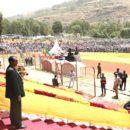Jason Stearns, Phil Clark and Richard Dowden debate the UN Group of Experts (with a focus on the DRC)
For the motion: Jason K. Stearns, political analyst, director of the Rift Valley Institute’s Usalama Project and author of the book, ‘Dancing in the Glory of Monsters: The Collapse of the Congo and the Great War of Africa’ (Public Affairs, 2012).
Against the motion: Phil Clark, Lecturer in Comparative and International Politics at SOAS, University of London, and author of the book, ‘The Gacaca Courts, Post-Genocide Justice and Reconciliation in Rwanda: Justice without Lawyers’ (Cambridge University Press, 2010).
OTJR’s opening online debate is moderated by Koen Vlassenroot, Professor and Research Director of the Conflict Research Group, University of Ghent and edited by Nicola Palmer, lecturer in criminal law at the Dickson Poon School of Law, King’s College, London. The debate forms part of our current examination of the different methodologies and epistemologies used to determine the occurrence of serious human rights violations. It throws a spotlight on the different ways of knowing harm in contexts of repressive rule or armed conflict, where access to information about human rights violations is often restricted. This debate will run over the next two months and will explore the recent reporting and monitoring of military activity in the eastern Democratic Republic of Congo, alongside broader issues around the role of international bodies in investigating and reporting on complex conflict zones. The debate addresses issues of the neutrality and impartiality of observers, the specific methods used by international investigators and their impact on global media, policy and legal responses.





